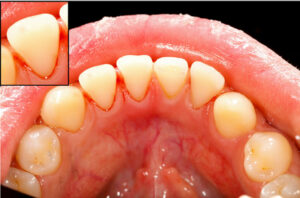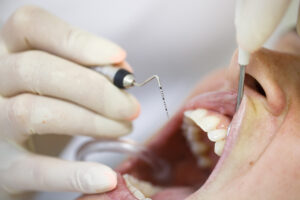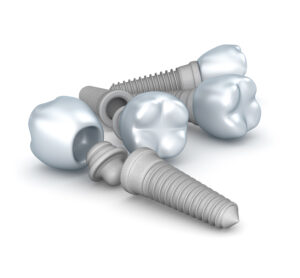Periodontal Dentist in – Mesa AZ & Gilbert AZ – Elite Smiles
What is Periodontal disease? Periodontal disease refers to a group of conditions affecting the gums and supporting structures of the teeth, characterized by inflammation and destruction of these tissues. Periodontal disease is a form of gum disease, with gingivitis representing a milder form that is reversible, and periodontitis being a more severe form that can result in tissue and bone loss, leading to tooth loss.
It is primarily caused by the accumulation of dental plaque and plaque buildup, which harbor periodontal pathogens. These bacteria initiate and sustain inflammation, leading to infection and, if left untreated, the progressive loss of the supporting structures of the teeth.
Stages of Periodontal Disease

There are several stages of periodontal disease, ranging from gingivitis to advanced periodontitis.
- Gingivitis is the earliest stage of gum disease and is characterized by gingival inflammation and redness of the gums.
- If left untreated, gingivitis can progress to more advanced stages of periodontal disease, including periodontitis, in which the gums begin to pull away from the teeth and form periodontal pockets. These pockets can become infected, leading to the loss of bone and supporting tissues, eventually leading to tooth loss.
In advanced stages, severe periodontitis and chronic periodontitis are classified as forms of advanced disease, marked by increased tissue destruction and a higher risk of tooth loss. Severe bone loss and loss of more gum tissue can also occur as the disease progresses.
There are several risk factors for periodontal disease, including poor oral hygiene, tobacco use, certain medications, and certain medical conditions such as diabetes. Genetics may also play a role in the development of gum disease. It is important to thoroughly clean all tooth surfaces to prevent disease progression. Tooth loss compared to individuals with fewer risk factors is more likely in those with multiple contributing factors.
Oral Health And Prevention

Preventing periodontal disease is important in order to maintain good oral health and prevent tooth loss. Good oral hygiene is the key to preventing gum disease. This includes brushing and flossing regularly, using an antimicrobial mouthwash, and visiting the dentist for regular cleanings and check-ups. Quitting tobacco use and managing chronic medical conditions, such as diabetes, can also help to reduce the risk of gum disease.
Professional Cleaning and Maintenance
Maintaining healthy gums and teeth goes beyond daily brushing and flossing—regular professional cleaning and maintenance are essential for preventing and managing periodontal diseases. Professional cleanings performed by skilled dental hygienists play a crucial role in removing plaque and tartar buildup, especially in areas that are difficult to reach with routine home care. This not only helps prevent gum disease but also supports overall oral health by reducing the risk of periodontal pocket formation and severe periodontal disease.
Dental hygienists are trained to spot early warning signs of gum disease, such as bleeding gums, receding gums, or sensitive teeth. By identifying these issues early, they can help prevent disease progression and the development of advanced periodontal disease, which can lead to loose or sensitive teeth, lost bone, and even tooth loss if left untreated. During a professional cleaning, your dental hygienist will use specialized tools to remove plaque and tartar from above and below the gum line, helping to keep your gum tissues healthy and your teeth firmly in place.
For those already experiencing gum disease, procedures like scaling and root planing are often recommended. These treatments involve carefully cleaning below the gum line and smoothing the root surfaces to discourage further bacterial buildup and promote healing of the periodontal tissues. In cases of advanced periodontal disease, additional surgical procedures such as bone grafting or guided tissue regeneration may be necessary to restore lost bone and connective tissue, helping to stabilize teeth and improve oral health.
Risk Factors
Certain risk factors, including poor oral hygiene, diabetes mellitus, smoking, and poor nutrition, can increase your susceptibility to periodontal diseases. Regular professional cleanings and maintenance visits can help counteract these risk factors by keeping your teeth and gums in optimal condition and allowing for early intervention when problems arise.
It’s important to remember that periodontal disease is a chronic inflammatory disease that can have serious consequences if not addressed promptly. Left untreated, it can result in progressive bone loss, periodontal tissue destruction, and ultimately, tooth loss. By prioritizing professional cleanings and maintaining good oral hygiene at home, you can prevent periodontal disease, protect your gum tissue, and enjoy a healthy, beautiful smile for years to come.
Partnering with your dental hygienist and committing to regular professional cleanings is one of the most effective ways to prevent gum disease and maintain strong, healthy gums and teeth. Take charge of your oral health today—your smile will thank you!
Treatment

Treatment for periodontal disease typically involves a combination of professional cleaning and at-home care. During a professional cleaning, the dentist or hygienist will remove plaque and tartar from above and below the gumline. They may also use special instruments to smooth rough areas on the tooth roots to help remove bacteria and reduce the risk of future accumulation. At-home care may include brushing and flossing more thoroughly, using antimicrobial mouthwash, and possibly taking medications as prescribed by the dentist.
In more advanced cases of periodontal disease, more aggressive treatment may be necessary. This may include procedures such as scaling and root planing, in which the roots of the teeth are cleaned and smoothed, or gum surgery to remove infected tissue and promote healing.
Dental Implants and Tooth Loss: Restoring Your Smile and Functionality

Tooth loss can have a significant impact on your overall oral health, as well as your self-esteem and confidence. Missing teeth can cause adjacent teeth to shift, affect your bite, and increase the risk of gum disease and tooth decay. Fortunately, modern dentistry has several options for restoring your smile and functionality, including dental implant therapy.
Our dental implants are a long-term solution for tooth loss and are made of Zirconium, a biocompatible material that integrates with your jawbone. The implant itself acts as a replacement for the tooth’s root, providing a sturdy foundation for the restoration that will sit on top. Dental implants can be used to replace a single tooth, multiple teeth, or even an entire arch.
One of the biggest advantages of dental implants is that they look, feel, and function like natural teeth. Unlike traditional dentures or bridges, dental implants are permanent and do not require special care or maintenance beyond regular brushing and flossing.
Dental Implant procedure
The dental implant procedure involves several steps, starting with a comprehensive evaluation to determine if you are a good candidate for the procedure. Your dentist will take x-rays and impressions of your teeth and jaw to create a customized treatment plan tailored to your needs.
During the implant placement procedure, your dentist will make a small incision in your gum tissue and insert the implant into your jawbone. Over time, the implant will fuse with your bone, creating a sturdy foundation for the restoration.
Once the implant has healed and integrated with your jawbone, your dentist will place an abutment, a small connector piece, on top of the implant. The abutment will hold the restoration in place, which can be a crown, bridge, or denture, depending on your needs.
With proper care and maintenance, dental implants can last a lifetime, making them a cost-effective and reliable solution for tooth loss.
Why Elite Smiles

Elite Smiles is a leading dental clinic in East Valley, on the border of Mesa/Gilbert, Arizona, specializing in periodontal disease prevention and treatment. Our team of experienced dentists and hygienists use the latest techniques and technologies to provide high-quality care to our patients. We are also a biological dental clinic, meaning that we use materials and techniques that are safe and compatible with the human body. This is especially important for patients with sensitivities or allergies to certain materials.
At Elite Smiles, we understand the importance of good oral hygiene and are dedicated to helping our patients maintain periodontal health. If you are concerned about gum disease or simply want to take steps to prevent it, we invite you to visit our clinic for a consultation. Our team will work with you to develop a personalized treatment plan to help you achieve and maintain good oral health.
Experience the Elite Smiles Advantage!
Elevate Your Dental Wellness with Our Comprehensive Range of Services:
